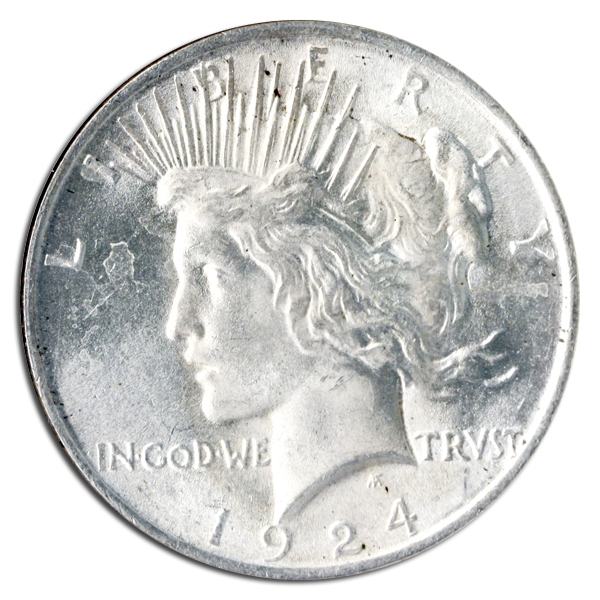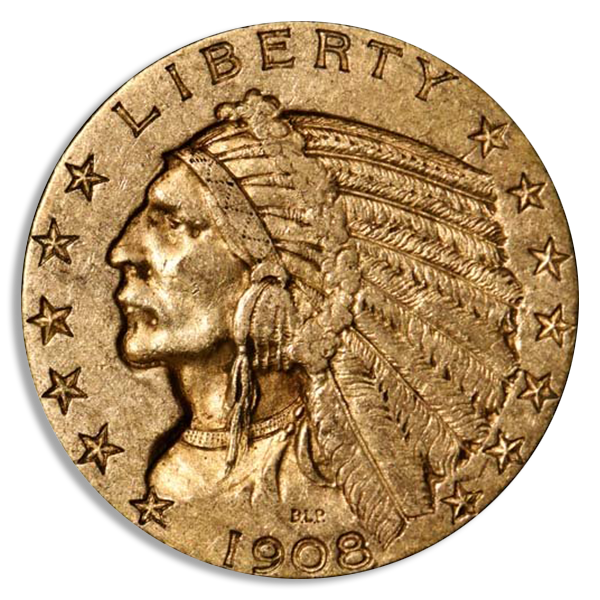1879 $5 Liberty PCGS MS64 CAC
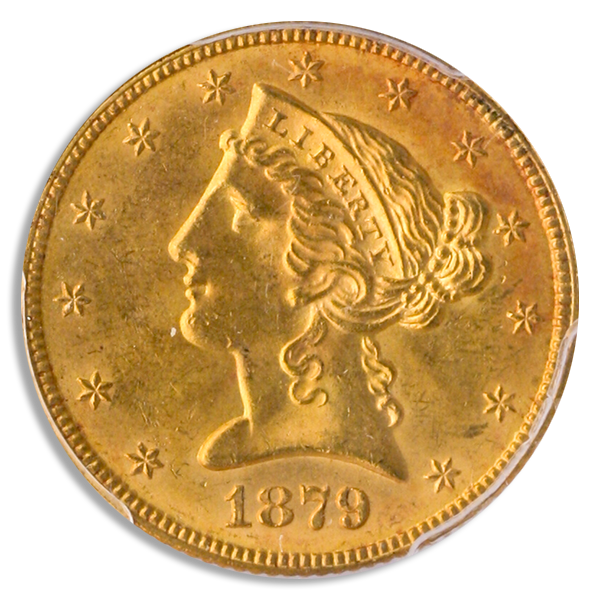


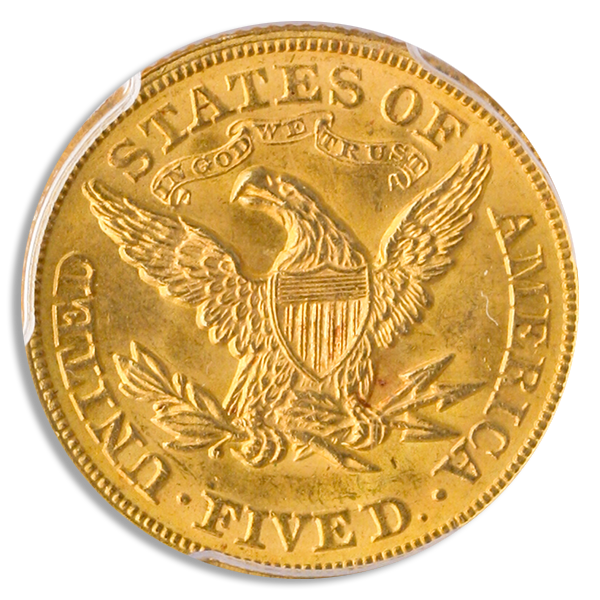

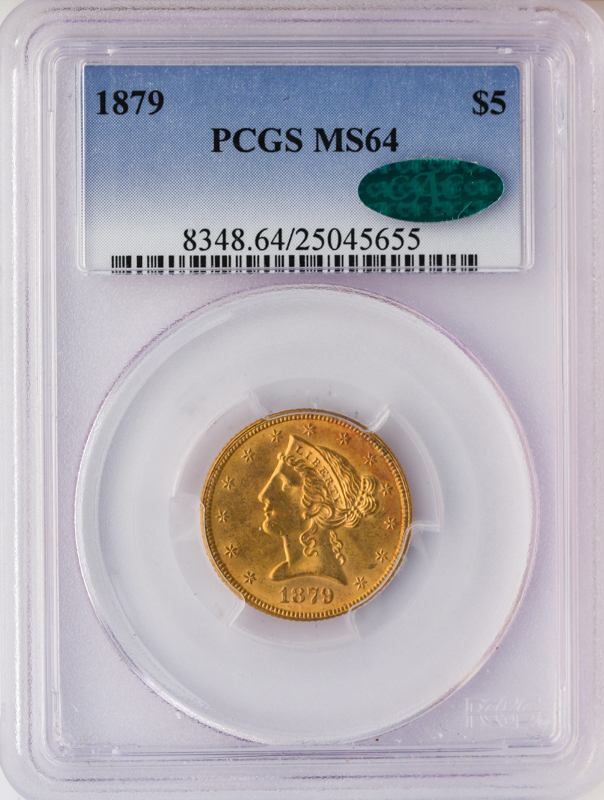

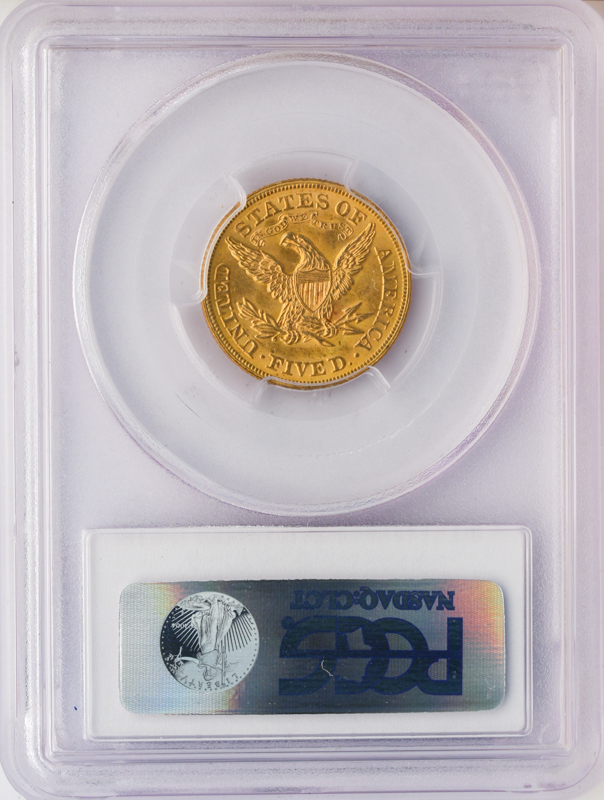

The reverse side of this Type showcases an eagle positioned beneath a scroll that bears the motto IN GOD WE TRUST in raised relief. Except for the presence of the scroll, it is virtually identical to the No Motto Type.
The incorporation of the motto into our coinage was spurred by Reverend Mark R. Watkinson of Ridleyville, Pennsylvania. The unsettling circumstances and hardships of the Civil War stirred profound religious sentiments within the populace, prompting Rev. Watkinson to advocate for its inclusion. Secretary of the Treasury Salmon P. Chase concurred, and leveraging his authority over coin inscriptions, Chase initiated the motto's addition to the 2-cent piece in 1864. Initially envisioned as "In God Our Trust," the definitive version may have been influenced by Chase's affiliation with his alma mater. Chase was an alumnus of Brown University, whose motto IN DEO SPERAMUS translates to "IN GOD WE HOPE." It is believed that this notion guided Chase's ultimate decision regarding the precise wording of the motto. The Coin Act of March 3, 1865 conferred discretionary power upon the Treasury to inscribe the motto "on all coins able to accommodate it," signifying coins of sufficient size. The Mint interpreted this directive to encompass all silver coins larger than a dime, half eagles, eagles, and double eagles. Not until 1908 did Congress mandate the inclusion of the motto on gold and silver coins. Subsequently, in 1955, Congress passed legislation enforcing the motto's presence on all coins.
With the exception of 1873, all With Motto Half Eagles dated prior to 1878 exhibit low mintages, rendering them scarce and valuable. The rationale for this can be traced back to the Civil War. During this period, gold coins were stockpiled, and all banks suspended specie payments. This hoarding practice resulted in a bifurcated pricing system, where payments in paper currency incurred higher costs compared to transactions conducted in gold. The minted gold coins were largely reserved for international trade, bank reserves, and specific contracts mandating exclusive gold payment. The anomaly of 1873 stems from the Treasury's deposit of substantial quantities of old, worn, obsolete gold coins for re-minting. Following the resumption of specie payments by banks in 1878, mintages escalated significantly, leading to a substantial influx of half eagles into circulation.
This coin is collected in various ways, often as a Type and within diverse sets. In addition to date or date and mintmark-oriented sets, a prevalent approach involves acquiring one coin from each of the seven Mints responsible for producing half eagles. Remarkably, half eagles are the sole coin minted at all seven U.S. Mints.
The incorporation of the motto into our coinage was spurred by Reverend Mark R. Watkinson of Ridleyville, Pennsylvania. The unsettling circumstances and hardships of the Civil War stirred profound religious sentiments within the populace, prompting Rev. Watkinson to advocate for its inclusion. Secretary of the Treasury Salmon P. Chase concurred, and leveraging his authority over coin inscriptions, Chase initiated the motto's addition to the 2-cent piece in 1864. Initially envisioned as "In God Our Trust," the definitive version may have been influenced by Chase's affiliation with his alma mater. Chase was an alumnus of Brown University, whose motto IN DEO SPERAMUS translates to "IN GOD WE HOPE." It is believed that this notion guided Chase's ultimate decision regarding the precise wording of the motto. The Coin Act of March 3, 1865 conferred discretionary power upon the Treasury to inscribe the motto "on all coins able to accommodate it," signifying coins of sufficient size. The Mint interpreted this directive to encompass all silver coins larger than a dime, half eagles, eagles, and double eagles. Not until 1908 did Congress mandate the inclusion of the motto on gold and silver coins. Subsequently, in 1955, Congress passed legislation enforcing the motto's presence on all coins.
With the exception of 1873, all With Motto Half Eagles dated prior to 1878 exhibit low mintages, rendering them scarce and valuable. The rationale for this can be traced back to the Civil War. During this period, gold coins were stockpiled, and all banks suspended specie payments. This hoarding practice resulted in a bifurcated pricing system, where payments in paper currency incurred higher costs compared to transactions conducted in gold. The minted gold coins were largely reserved for international trade, bank reserves, and specific contracts mandating exclusive gold payment. The anomaly of 1873 stems from the Treasury's deposit of substantial quantities of old, worn, obsolete gold coins for re-minting. Following the resumption of specie payments by banks in 1878, mintages escalated significantly, leading to a substantial influx of half eagles into circulation.
This coin is collected in various ways, often as a Type and within diverse sets. In addition to date or date and mintmark-oriented sets, a prevalent approach involves acquiring one coin from each of the seven Mints responsible for producing half eagles. Remarkably, half eagles are the sole coin minted at all seven U.S. Mints.
A LITTLE STICKER MAKES A BIG DIFFERENCE.
Within each number of the coin grading scale is a small range of condition from low-end to high-end. Certified coins of the same grade can be of varying quality. Many of today’s collectors want coins that are solid or premium quality for their assigned grade. CAC holds coins to a higher standard so you can be confident in the value of yours. We verify previously graded coins … and award our sticker only to those coins that meet the standard for today’s selective buyer.
WHAT THE CAC STICKER MEANS:
- Verified. Your coin has been verified as meeting the standard for strict quality within its grade.
- Guaranteed. CAC stands behind our verification.
THE CAC STICKER IS BACKED BY EXPERIENCE.
CAC was founded by leading members of the numismatic community, including John Albanese, a respected authority on coin grading and the rare coin market.

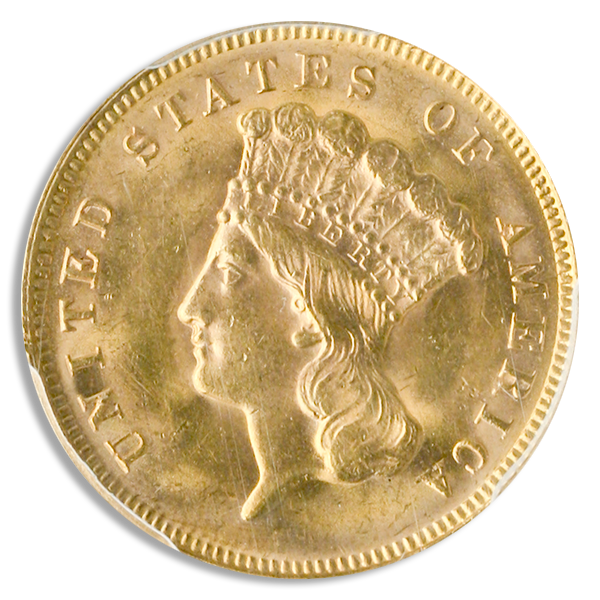
 Quick View
Quick View